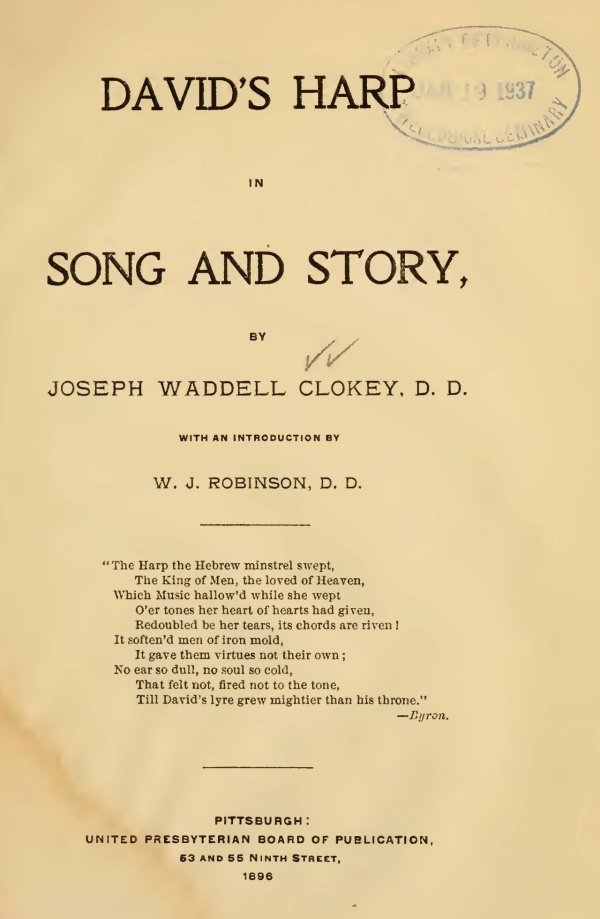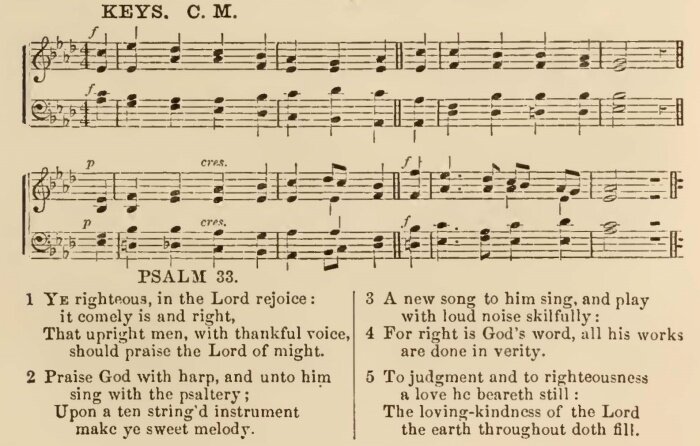Receive our blog posts in your email by filling out the form at the bottom of this page.
Have you visited our Compilations page lately? It is the home for many interesting works by denominations or groups of authors, but today we are highlighting the assembled psalters and hymnals which represent the sacred song utilized in the praise of God by American Presbyterians. This project is ongoing, but we invite you to check out what is currently available.
Psalters
The Psalms of David in Meeter [Kirk of Scotland] (1650)
The Book of Psalms [UPCNA] (1871)
The Book of Psalms: The Scottish Version Revised, and the New Versions Adopted by the United Presbyterian Church of North America [UPCNA] (1871)
The Psalter of the United Presbyterian Church of North America [UPCNA] (1887)
The Psalms: A Revision of the Scottish Metrical Version With Additional Versions [RPCNA] (1888)
The Psalter: With Music [RPCNA] (1890)
The Psalter, or, Book of Psalms: A Revision of the Metrical Version of the Bible Psalms, With Additional Versions [RPCNA] (1893)
The Psalter With Music [UPCNA] (1900)
The Psalms in Meter [Joint Committee] (1905)
The Psalter, or, Book of Psalms: A Revision of the Metrical Version of the Bible Psalms, With Additional Versions [RPCNA] (1907)
The New Metrical Version of the Psalms [Joint Committee] (1909)
The Psalter With Responsive Readings [UPCNA] (1912)
Psalter Hymns: For Use in Families, Sabbath Schools and Bible Classes, Young People's Societies, Prayer Meetings, and Union Services [UPCNA] (1912)
The Book of Psalms: Rendered in Metre and Set to Music [RPCNA] (1912)
The Book of Psalms: Rendered in Metre and Set to Music [RPCNA] (1920)
Note that the first Psalter employed by the RPCNA (besides the 1650 Scottish Metrical Psalter which it inherited - which is true for all branches of American Presbyterianism as well) was produced by William Wallace Keys in 1863, and is known to history as the Keys Psalter.
Hymnals (including Psalter-Hymnals)
[Isaac Watts] Psalms, Carefully Suited to the Christian Worship in the United States of America: Being an Improvement of the Old Versions of the Psalms of David; Allowed, by the Reverend Synod of New York and Philadelphia, to be Used in Churches and Private Families [PCUSA] (1787)
[Isaac Watts] Psalms, Carefully Suited to the Christian Worship in the United States of America: Being an Improvement of the Old Versions of the Psalms of David; Allowed, by the Reverend Synod of New York and Philadelphia, to be Used in Churches and Private Families [PCUSA] (1787, 1794)
Psalms and Hymns Adapted to Public Worship, and Approved by the General Assembly of the Presbyterian Church in the United States of America [PCUSA] (1830)
[George Fleming] Psalms and Hymns, Adapted to Public Worship, and Approved by the General Assembly of the Presbyterian Church in the United States of America [PCUSA] (1834, 1835)
Sacred Harmony: A Selection of Plain Tunes Adapted to the Use of the Psalms of David [Associate Reformed Synod of New-York] (1834)
Devotional Hymns Adapted to Social, Private and Public Worship [Old School PCUSA] (1842)
Church Psalmist, or, Psalms and Hymns: For the Public, Social, and Private Use of Evangelical Christians [New School PCUSA] (1843)
Parish Psalmody: A Collection of Psalms and Hymns For Public Worship (1844)
The Presbyterian Psalmodist: A Collection of Tunes Adapted to the Psalms and Hymns of the Presbyterian Church in the United States of America [PCUSA] (1852)
Hymnal of the Presbyterian Church [PCUSA] (1867)
Psalms and Hymns For the Worship of God: Approved by the General Assembly of the Presbyterian Church in the United States, at Its Meeting in Memphis, Tennessee, November, 1866 [PCUS] (1867)
The Sacrifice of Praise: Psalms, Hymns, and Spiritual Songs Designed For Public Worship and Private Devotion, With Notes on the Origin of Hymns (1869)
The Presbyterian Hymnal [PCUSA, music and words] (1874)
The Presbyterian Hymnal [PCUSA, words only] (1874)
The New Psalms and Hymns [PCUS] (1901)
Bible Songs: A Collection of Psalms Set to Music For Use in Church and Evangelistic Services, Prayer Meetings, Sabbath Schools, Young People’s Societies, and Family Worship [UPCNA] (1901)
The Book of Common Worship [PCUSA] (1906)
The Psalter Hymnal: The Psalms and Selected Hymns [UPCNA] (1927)
Note that other hymnals are available on individual pages, such as Archibald Alexander, A Selection of Hymns, Adapted to the Devotions of the Closet, the Family, and the Social Circle (1831); Leonard Woolsey Bacon, Congregational Church-Music; With 150 Psalms and Hymns (1854); Nathan Sidney Smith Beman, Sacred Lyrics: or, Select Hymns, Particularly Adapted to Revivals of Religion, and Intended as a Supplement to Watts (1832) and Sacred Lyrics, or Psalms and Hymns Adapted to Public Worship (1841); Louis FitzGerald Benson, The Hymnal (1895) and The Chapel Hymnal (1898, 1910), as well as others; Henry Augustus Boardman, A Selection of Hymns: Designed as a Supplement to the “Psalms and Hymns” of the Presbyterian Church (1861) and Hymns of Praise (1867); George Buist, A Collection of Hymns for Public and Private Worship, Approved by the Presbytery of Charleston (1796); Thomas Cleland, Evangelical Hymns, For Private, Family, Social, and Public Worship (1831); Henry Sloane Coffin, Hymns of the Kingdom of God: With Tunes (1910); William Coombs Dana, A Collection of Hymns: Supplementary to the Psalms and Hymns of Dr. Watts (1859); James Gallaher, New Select Hymns, Designed to Accompany Watts’ Psalms & Hymns (1835); Edwin Francis Hatfield, Freedom's Lyre: or, Psalms, Hymns, and Sacred Songs, For the Slave and His Friends (1840), The Church Hymn Book, With Tunes; For the Worship of God (1872), and The Chapel Hymn Book, With Tunes; For the Worship of God (1873); Robert Pollok Kerr, Hymns of the Ages For Public and Social Worship (1891); Willis Lord, Hymns of Worship: Designed For Use Especially in the Lecture-Room, the Prayer-Meeting and the Family (1858); James Lyon, Urania: A Collection of Psalm-Tunes, Anthems and Hymns (1761); Lowell Mason, Church Psalmody: A Collection of Psalms and Hymns, Adapted to Public Worship (1831), and more; James Ormsbee Murray, The Sacrifice of Praise: Psalms, Hymns, and Spiritual Songs Designed For Public Worship and Private Devotion, With Notes on the Origin of Hymns (1869); Samson Occom, Hymns (1773 and A Choice Collection of Hymns and Spiritual Songs (1774, 1785); Charles Seymour Robinson, Songs of the Church: or, Hymns and Tunes For Christian Worship (1862, 1864), Songs For the Sanctuary: or, Hymns and Tunes For Christian Worship (1865, 1867), Psalms and Hymns, and Spiritual Songs: A Manual of Worship For the Church of Christ (1875); Philip Schaff, Hymns and Songs of Praise For Public and Social Worship (1874); Gardiner Spring, The Brick Church Hymns, Designed For the Use of Social Prayer Meetings and Families, Selected From the Most Approved Authors and Recommended by Gardiner Spring, D.D., Pastor of Said Church (1823); Nathan Strong, The Hartford Selection of Hymns From the Most Approved Authors (1799); Thomas DeWitt Talmage, Many Voices; or, Carmina Sanctorum (1891); Robert Ellis Thompson, The National Hymn-Book of the American Churches (1893); Henry Jackson Van Dyke, Jr., The Church Psalter: One Hundred and Four Psalms Arranged Under Subjects For Responsive Reading (1891); James Patriot Wilson, Sr., Hymns For Social Worship, Collected From Various Authors (1817); and Samuel Ramsey Wilson, Hymns of the Church, Ancient and Modern, For the Use of All Who Love to Sing the Praises of God in Christ, in the Family, the School, or the Church; With a Discourse on Music as a Divine Ordinance of Worship (1872); among many others.
There is much matter here for those who wish to explore how early American Presbyterians offered “the sacrifice of praise, the fruit of lips” (Heb. 13:15) in the sanctuary. The questions raised by the regulative principle of worship about the content of song to be used (inspired psalms or uninspired hymns), as well as the propriety and practicality of instrumental accompaniment, are dealt with in a whole other body of literature to which we have alluded in the past. This collection on the pages of Log College Press is drawn to a great extent from the Louis FitzGerald Benson Collection of Hymnals and Hymnody at the library of Princeton Theological Seminary, as well as from a variety of other sources. We continue to add more literature related to psalmody and hymnody often so be sure to check back here periodically as our collection grows.


























